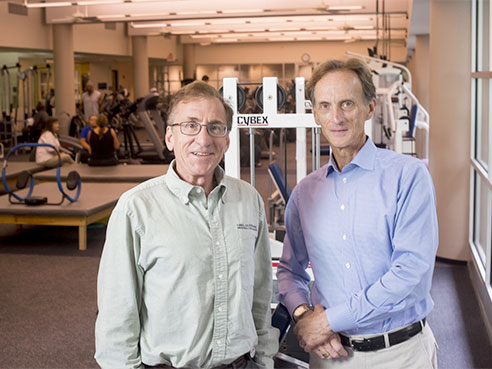 James Rimmer, left, and Jeff UnderwoodInvestigators with the University of Alabama at Birmingham School of Health Professions UAB/Lakeshore Research Collaborative have been awarded grants from the National Institutes of Health and the Centers for Disease Control and Prevention totaling more than $10 million over the next five years.
James Rimmer, left, and Jeff UnderwoodInvestigators with the University of Alabama at Birmingham School of Health Professions UAB/Lakeshore Research Collaborative have been awarded grants from the National Institutes of Health and the Centers for Disease Control and Prevention totaling more than $10 million over the next five years.
The CDC award is a five-year, $7.5 million grant for the National Center on Health, Physical Activity and Disability, or NCHPAD, to expand its role as a knowledge information and translation center to promote access to health and wellness programs for people with disabilities across the nation using an evidence-based framework referred to as N-KATS, for NCHPAD Knowledge Adaptation, Translation and Scale Up.
The NIH award is a new five-year, $2.6 million R01 grant that will use a theory-driven eHealth platform and innovative physical activity program referred to as movement-to-music, or M2M, to deliver a customized, home-based intervention to adults with mobility disability. Participants will be recruited through UAB’s Department of Physical Medicine and Rehabilitation at Spain Rehabilitation. Amie B. McLain, M.D., professor and chair of the Department of Physical Medicine and Rehabilitation, is a co-investigator on the study. Lakeshore staff will be involved in data collection and preparing the home-based materials.
“When we were working to form the collaborative, we established that a major objective would be to engage in research that held value and benefit to people living today with physical disability, and in the short time of just a few years we feel that this objective is being addressed and pursued, if not met,” said Lakeshore Foundation President Jeff Underwood. “As we continue to integrate research and evaluation into the daily programs of Lakeshore, we are confident we will be able to continue to improve programs and document through research the positive impacts of exercise, wellness and sport for people with physical disability.”
“We are particularly excited about this expansion in the area of telehealth,” said Harold P. Jones, Ph.D., dean,UAB School of Health Professions, “as it offers us the opportunity to engage individuals with disabilities in directed exercise programs in locations, including their homes, that are distant from the UAB and Lakeshore campuses. As a school and as part of our strategic plan, we are investing in renovations to provide a first-class telehealth center for this and other projects.”
Scale Up Program
Lakeshore Foundation Endowed Chair in Health Promotion and Rehabilitation James Rimmer, Ph.D., director of the UAB/Lakeshore Research Collaborative and a pioneer in exercise and disability research, recognized that people with physical disability have less access to activity overall and not just your typical physical activity.
He notes that unemployment or underemployment means less unstructured activity than others incur at work. And the incidence of chronic health conditions means less activity whether indoors or outdoors.
Both projects are designed to overcome many environmental barriers commonly faced by people with physical disability.
“The growing availability of internet access among people with disabilities provides an unprecedented opportunity to use telehealth as a mechanism for reaching this underserved population,” said Rimmer, chair of the President’s Council on Fitness, Sports and Nutrition Science Board. “This method will allow people with disabilities to achieve higher levels of regular physical activity and, in turn, significantly improve their health and function.”
N-KATS Program
The new N-KATS model is designed to help reverse the disproportionately higher rates of obesity among children and adults with physical disabilities. It is a joint partnership that reaches beyond the UAB/Lakeshore Research Collaboration and includes investigators from the UAB schools of Health Professions, Medicine and Public Health.
The N-KATS framework contains four sequenced phases.
- Phase I: Collecting evidence-based programs and models in physical activity, nutrition and obesity that are reviewed, catalogued and adapted with GRAIDs (Guidelines, Recommendations and Adaptations Including Disability)
- Phase II: Disseminating resources, materials and tools to early adopters and 'shovel-ready' programs through national networks and partnerships
- Phase III: Providing training to a select group of service providers with NCHPAD staff serving as facilitators
- Phase IV: Capturing successful elements of community health inclusion and effectively scaling 'best practices' to communities nationwide
“To accomplish our goals requires a comprehensive and coordinated approach that uses policy, system and environmental change to transform communities into inclusive health communities that support and promote healthy lifestyle choices for people with disabilities,” said Rimmer, who is also the Lakeshore Foundation Endowed Chair in Health Promotion and Rehabilitation Sciences. “With this new knowledge-to-practice framework — the N-KATS — we now have the capacity to build and expand upon successful, inclusive best practices that can transform communities into places that support and promote healthy lifestyles for the more than 50 million Americans with disabilities. The combined effects of UAB researchers and an outstanding Lakeshore Foundation staff were clearly major strengths in both of these applications.”